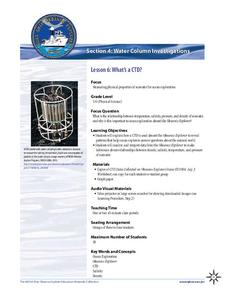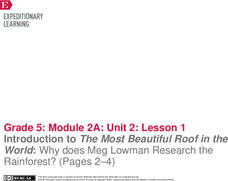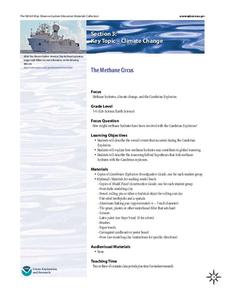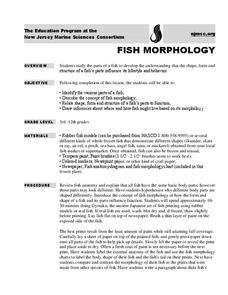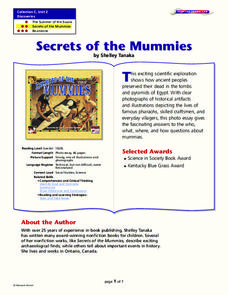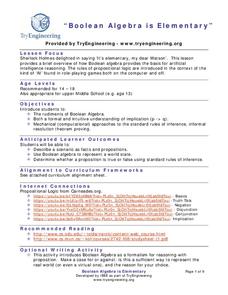Chicago Botanic Garden
Recognizing Change (Observation vs. Inference)
What is the difference between making inferences and making observations? Young climatologists refer to a PowerPoint to make observations on each slide. They record their observations in a provided worksheet before drawing a...
American Physiological Society
Did I Observe it or Infer it?
Take the mystery out of inquiry! When young scientists learn to use their keen powers of observation to make smart inferences about a situation, they are well on their way to understanding what the scientific method is all about. Using...
NOAA
What's a CTD?
Why are the properties of the water important when exploring the ocean? Young scientists discover the tools and technology used in deep sea exploration in the fourth installment in a five-part series. Groups work together to examine...
EngageNY
Building Background Knowledge and Making Inferences: What Is a Natural Disaster?
That's a disaster! Scholars complete a gallery walk to view images and make inferences about natural disasters. They fill out a note catcher about what they observe and infer any questions they may have. They then participate in a World...
EngageNY
Introduction to The Most Beautiful Roof in the World: Why does Meg Lowman Research the Rainforest? (Pages 2–4)
Let's go for a walk. Scholars take a book walk through the text The Most Beautiful Roof in the World and create an anchor chart to list the features of informational text. They then take a close look into the character Meg Lowman by...
Curated OER
Food for Spaceflight
When astronauts get hungry in outer space, they can't just call and have a pizza delivered. In order to gain an appreciation for the challenges associated with space travel, young learners are given the task of selecting, testing, and...
Curated OER
Designing a Crew Exploration Vehicle
Take your class on an out-of-this-world adventure with this fun engineering design activity. Working in small groups, young scientists design, build, and test crew exploration vehicles using some creativity, teamwork, and an assortment...
EngageNY
Making Inferences About Informational Text: Science Talk on How My Insect Contributes to the Rainforest Ecosystem
We need to talk. Learners participate in a science talk by discussing the idea of how insects are important to the rainforest. They record notes about their conversations as they talk. For homework, pupils add to their field journals.
NOAA
Animals of the Fire Ice
When the sun's rays can't reach the producers in a food web, where does all the energy come from? Extreme environments call for extreme food sources. Young scientists investigate creatures that appear to get their energy from methane...
NOAA
Journey to the Unknown
What's it like to be a deep-sea explorer? Tap into the imaginations of your fifth and sixth graders with a vivid lesson, the second part of a six-part adventure. Learners close their eyes and submerge themselves in an expedition aboard...
NASA
Let's Investigate Mars
Take your science class on a hypothetical field trip to Mars with an engaging astronomy lesson. After first learning about NASA's Mars rover missions, young scientists plan their own scientific investigations of Earth's nearest neighbor.
NOAA
The Methane Circus
Step right up! An engaging research-centered lesson, the third in a series of six, has young archaeologists study the amazing animals of the Cambrian explosion. Working in groups, they profile a breathtaking and odd creature and learn...
Consortium for Ocean Science Exploration and Engagement (COSEE)
Fish Morphology
Life comes in all different shapes and sizes, and fish are no exception. Here, young scientists create fish prints as they learn how specific characteristics allow different species to survive in their particular habitats.
Curated OER
Secrets of the Mummies
How did the ancient people of Egypt preserve their dead so well that their bodies are still recognizable today? Learn the painstakingly complex process they used for preservation. Young scholars read and summarize a narrative detailing...
Curated OER
Fish Communities in the Hudson
Learning to read data tables is an important skill. Use this resource for your third, fourth, or fifth graders. Learners will will study tables of fish collection data to draw conclusions. The data is based on fish environments in the...
Curated OER
Ornithology and Real World Science
Double click that mouse because you just found an amazing lesson! This cross-curricular Ornithology lesson incorporates literature, writing, reading informational text, data collection, scientific inquiry, Internet research, art, and...
Curated OER
“THE LORAX” by Dr. Seuss
Few children's books convey the message of conservation as well as Dr. Seuss' The Lorax. Read the story aloud, emphasizing the interconnectedness of plants and animals in an ecosystem and discussing different ways people can help the...
Illinois Department of Natural Resources
Section One: What is Biodiversity?
Four intriguing and scientific activities invite learners to explore the natural resources of their town. The activities cover concepts such as genetic traits, organizing species in a taxonomy, the differences between different species...
NOAA
Biological Oceanographic Investigations – Keep Away
As of 2015, there are 53,481 oil wells in the Gulf of Mexico. Scholars determine how species diversity is impacted based on the ecosystem's distance from a drilling platform. It focuses on finding the mean of data sets and creating bar...
Curated OER
Science Safety is Elementary
Third graders are introduced to the importance of science safety. As a class, they role play through different safety procedures and decide which senses need to be protected for different scenerios. They discuss how to avoid hazardous...
Curated OER
Get a Leg Up
Traveling through space is an amazing experience, but it definitely takes a toll on the body. After reading an article and watching a brief video, learners perform an experiment that simulates the effects of zero gravity on the human body.
Curated OER
Fossil Inferences
Fourth graders use their knowledge about fossils to arrange fossil pictures in sequence from oldest to youngest. They explain how fossils can be used to make inferences about past life, climate, geology, and environments and discover...
TryEngineering
Boolean Algebra is Elementary
See how Boolean algebra relates to video games with a lesson that teaches young scholars how to use Boolean algebra to create rules for a virtual world. They test the rule base for consistency in groups.
Curated OER
In Touch with Apples
Students read "How To Make an Apple Pie and See the World", the story of a girl who traveled the world to find the ingredients to make her apple pie. They conduct a series of interdisciplinary activities including testing their senses,...




